CRIMINAL STATE
South Africa’s organised crime climbs to Italy’s levels, racing past Mexico, Somalia and Libya
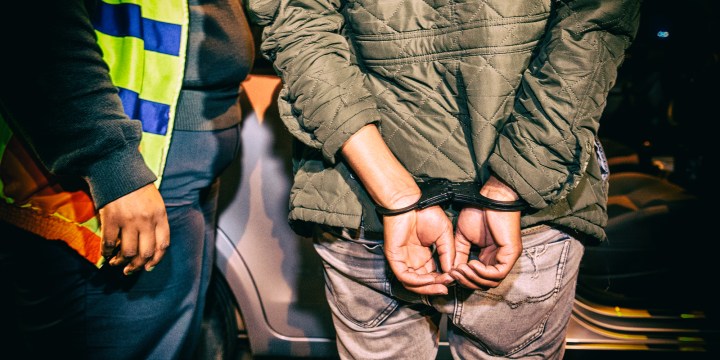
Report finds alarming increases in mafia-type crimes but says the situation is not hopeless.
A country assessment of South Africa’s organised crime has found that it is climbing and now is in the same quadrant as Italy’s — one of the world’s oldest hubs of mafia methods.
The chart shows that South Africa is now moving up the quadrant of criminality and has raced past Mexico, Somalia and Libya. It is in the sphere of Guatemala, Brazil and Russia. We are now properly notorious.
“This is an existential crisis but South Africa has a degree of resilience,” says Mark Shaw, the Director of the Global Initiative Against Transnational Organised Crime. (Gitoc) “It’s serious, but we can do something about it. It can’t be a law enforcement response alone.”
The horizontal axis shows the level of organised criminality while the vertical shows a society’s resilience. Ideally, you want to be in the upper left-hand quadrant with countries like Norway, the UK and Sweden. That may not happen soon.
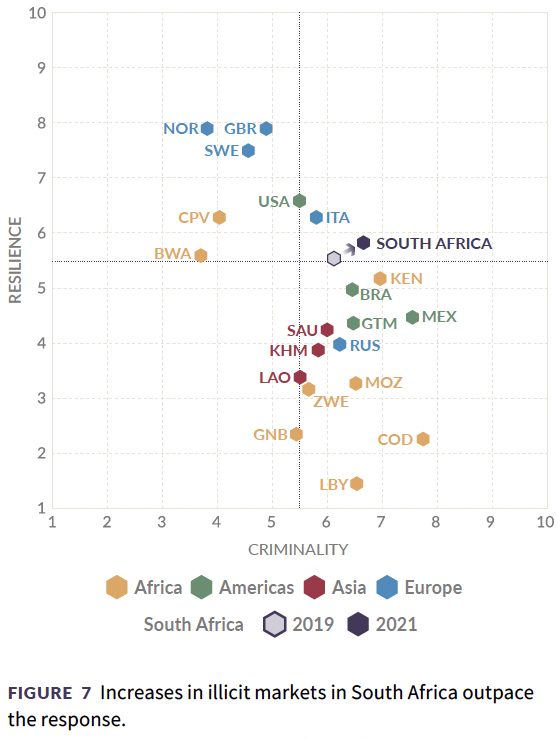
Source: Global Organized Crime Index 2021.
The country assessment shows that the majority of 15 crime measures levels are increasing with very few stable. None are declining.
“Below the surface, and often not immediately perceptible in each individual incident, is a dark web: a criminal ecosystem that links many of these countless criminal acts, which need to be understood as the manifestations of an escalating set of problems, driven by South Africa’s increasingly sophisticated, violent underworld economy,” said Shaw.
The numbers below show how South Africa ranks in mafia-style groups, criminal networks, state-embedded actors (what we call State Capture) and foreign actors — each is high at a measure of over 7 out of 10. Foreign actors are crime bosses who run, for example, cable theft and export syndicates, kidnapping and extortion rings as well as what Shaw calls the “bleeding sore” crimes of illicit mining and also the export wing of gang activity.

Source: Global Organized Crime Index 2021.
The chart on the murder rate in South Africa (below) may not look like it, but it is the good news chart. It shows that in the years when there was a significant 50% decline in the murder rate, South Africa took steps against organised crime and it paid a relative ‘peace dividend’. It was a “long and sustained decline” says Shaw, and it was achieved through more effective gun control, among others.
“One argument (to explain the decline) is there was greater social and co-operative cohesion in responding to crime,” he says. That period offers solutions. More about that later.
From about 2011, the graph turned terrifyingly northward which of course corresponds with the ‘capture’ of the criminal justice system and its destabilisation. President Cyril Ramaphosa has moved to reform that system but it’s not working, as the murder rate has increased by 38% over 10 years, the country assessment shows.
“Once again, big words failed to produce big results, and most of the organised crime categories identified in the stabilisation approach showed little signs of being disrupted,” says the report released on September 21. “Much of the intellectual and ideological architecture designed to combat organised crime at the systematic level remains unused or underused.”
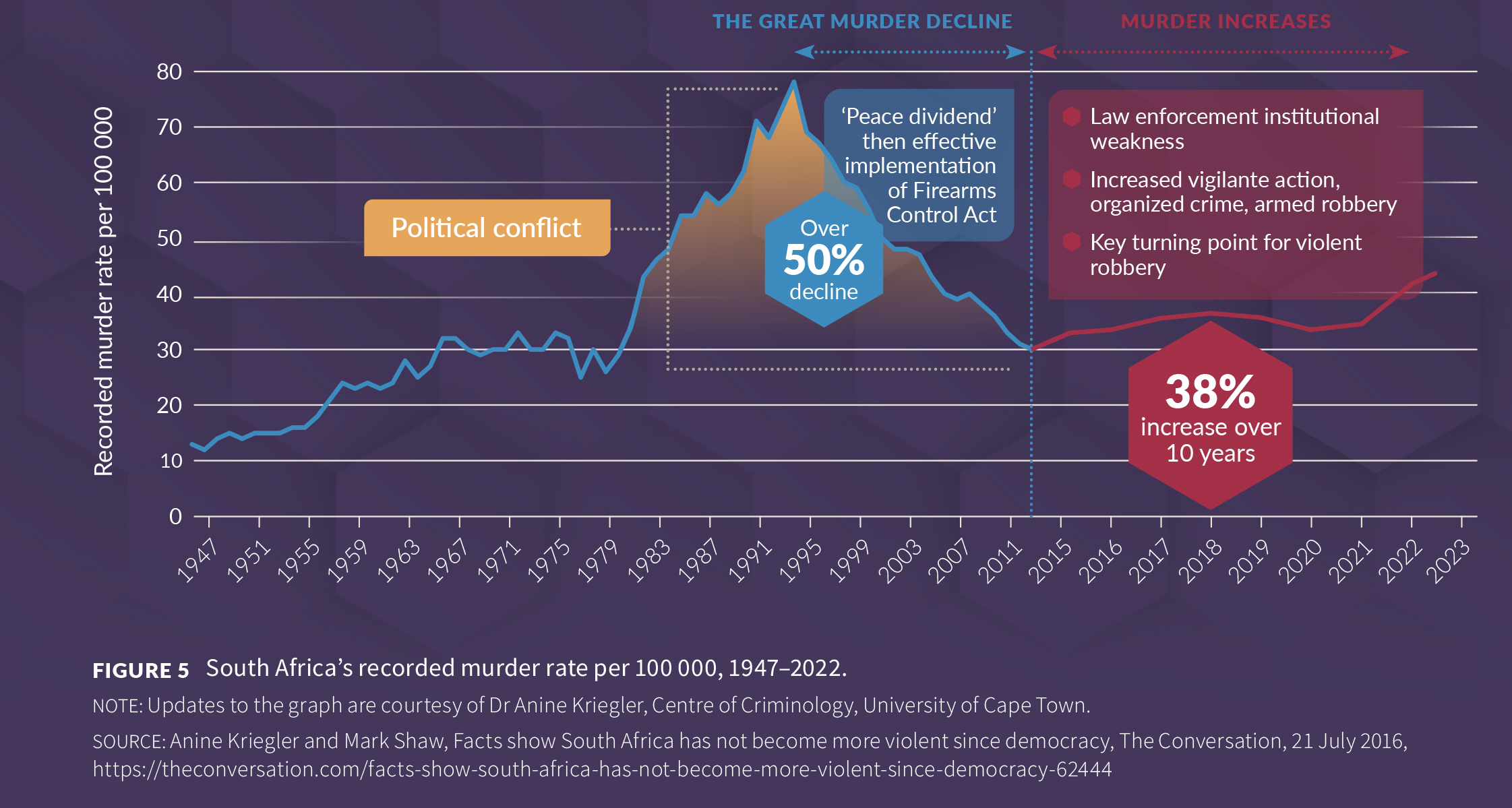
South Africa now ranks 19th in the world for the penetration of organised crime and it’s not good company to be in, as the map shows. Our organised crime is now worse than Mexico, Somalia and Libya.
But the rankings must be viewed in national context and South Africa has several things going for it to ensure that it won’t climb higher — but it requires political will.
“Is there enough political will? (At the moment), it’s reactive and fire-force based. You need long-term preventative responses and a strategic, systematic approach. You need security for economic growth. You need to bring security and then you bring investment,” says Shaw.
Visit Daily Maverick’s home page for more news, analysis and investigations
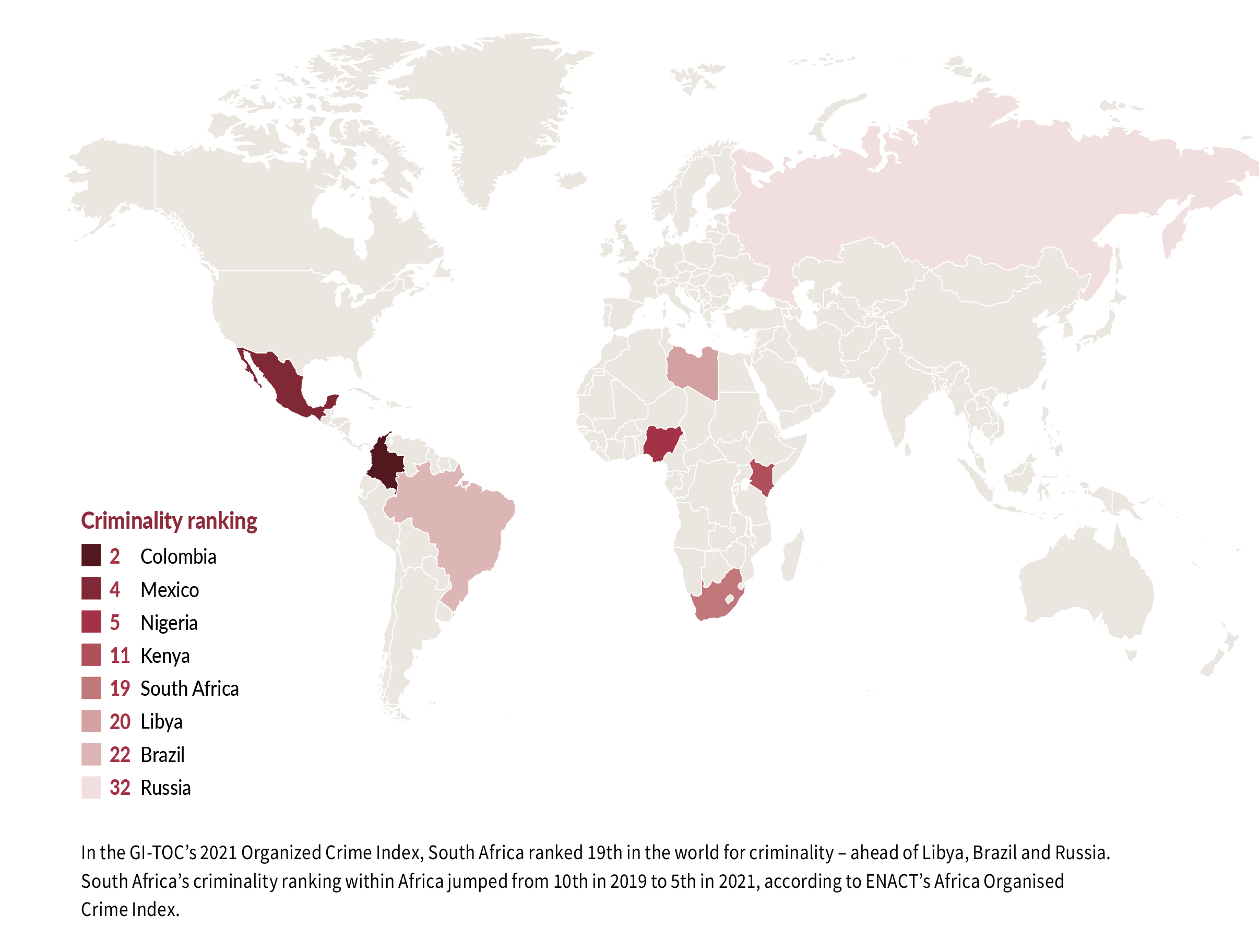
The graphic charts below bring us right up to the present. While Eskom CEO Andre de Ruyter said this latest stage of intensified power cuts is not because of sabotage, attacks on critical infrastructure are a major reason for the energy crisis. Cable theft and a series of mafia-type, organised operations at Eskom were entrenched in the high era of State Capture. The chart below shows that critical services are under attack and harm the ability of state to function. This is evident in the collapse of transport networks and also of energy networks. This week’s descent into Stage 6 hell is an example of organised crime at work because Eskom’s entire system of operations has been destabilised.
The Gitoc assessment analysed 15 areas of organised crime set out in the charts below. This shows that major areas of our lives are now impacted by organised crime — and while it can be tracked back for many decades, the trendline is headed upward in often distressing and felt ways.
“Although many countries have more developed and larger illicit markets — such as the drugs market in Mexico, or arms trafficking in Iraq — few host so many illicit markets across such a broad spectrum of criminal activity,” says the assessment. “Corruption — which is a component of most illicit markets — indirectly embeds organised crime within state institutions, most notably law enforcement agencies. Small-scale bribes buy protection and criminals’ ability to operate with impunity, while high-level corruption often sees state actors becoming active participants in crime or stakeholders in illicit markets,” the report says to show the impact of corruption. It links three trends: the growth of organised crime, the rise of elite corruption and the erosion of state institutions. This is where we find ourselves, but what do we do now?
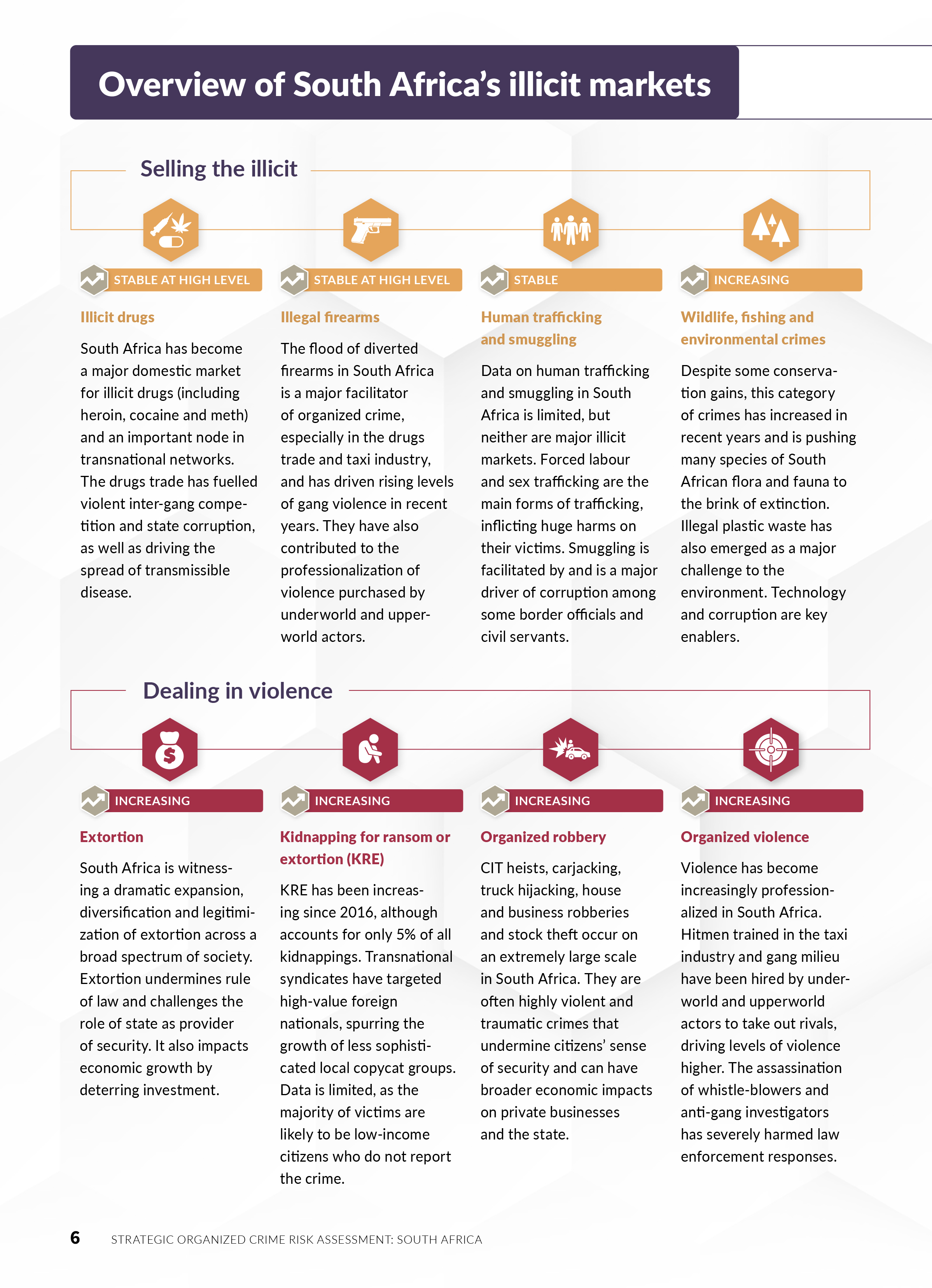
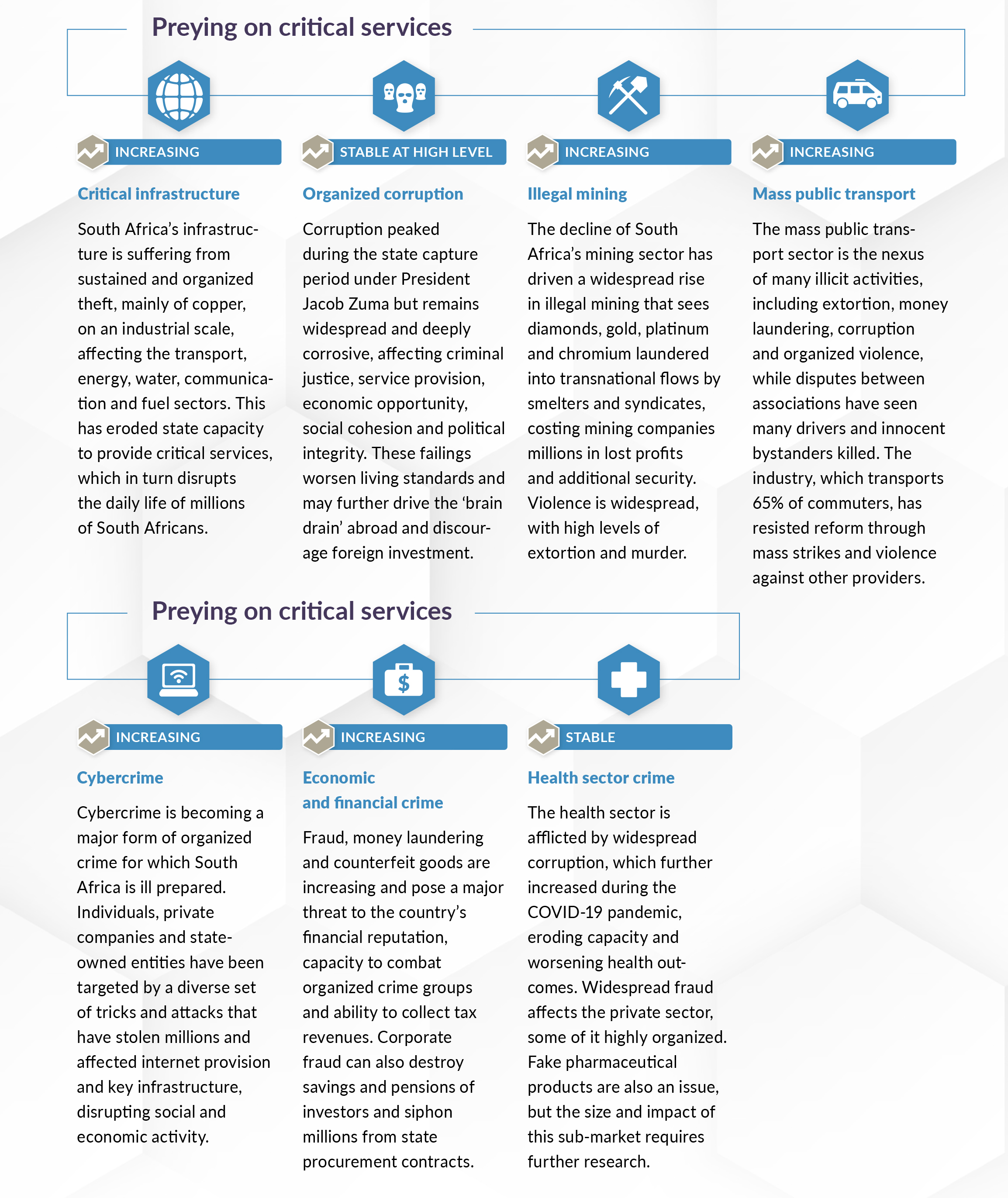
“The report serves as a call to action. If South Africa’s future is not to be increasingly unstable, a more strategic response to organised crime is needed urgently. Policymakers from a wide variety of areas need to come around to accepting the real threat of organised crime, and they need to act swiftly. Left unchecked, organised crime and its associated illicit markets will continue to inflict serious harm,” the assessment says.
“Tackling this characteristic of embeddedness in many cases not only requires disrupting the ties that link criminal entities with their environment, but also addressing the surrounding contexts. If only the criminal element is targeted, the conditions that enabled, protected and rewarded the original criminal beneficiaries will quickly be exploited by new actors.”
So, what can be done? Obviously, criminal justice system reforms need to kick in much more rapidly. Shaw says a good start will be gun control, dealing with mafia-like groups and cyber-crime which, for example, has taken out banks and Transnet systems. “Strategy does not need to be a (many) years-long process,” he says.
South Africa’s rich and deep civil society is so embedded in the communities it operates in that alternative forms of engagement can help to broaden a response and retrench embedded networks.
“In the private sector, there is a reservoir of expertise in South Africa that can bolster the state’s response. There have been offers by the private sector to contribute staff time and expertise to SAPS in the sphere of economic and financial crime, while business may have the interest and ability to assist the state in other ways,” says the report. DM




















 Become an Insider
Become an Insider
Thanks to the ANC
I am chuffed that at least there is something that South Africans, Nigerians, Mozambiquean and Zimbabwean folk are getting close to the number 1 spot in the world, thanks to the diaspora of international non citizens living the good life here in the goos ole RSA.
Super news to share with the world, well done all….
I think we must banish the idea that Nigerians are behind the drug problem. We have had drugs in the Western Cape and Gauteng long before 1994. It was largely confined in the so – called coloured townships and some African townships with some soccer team leaders known to be drug lords with the arm of the law very far from them and others known for diamond smuggling. When you have police involvement, corruption at Home Affairs and customs and the deliberate disbandment of specialised police units that were all over the country you have a problem. When Cele was appointed Commissioner, an exodus of qualified police begun complaining about promotion of MK and Apla people without policing skills and knowledge. Dobsonville, lost its commander and thirty detectives at one time.
To say the situation is not hopeless is more misplaced optimism. It starts at the top of the law enforcement and prosecution ladder – incompetence and corruption. When the former top cops are being arrested for corruption, what right do we have to expect better from the cops at the coalface whose lives are at risk if they open their mouths or try to do something about it.
It is political will that has got us here! The refusal by Mbeki to deal with corruption and his attacks on anyone criticising the ANC a racist conspiracy, set the ball rolling. Corrupt police and politicians thrived, while whistle blowers were hounded or assassinated. So, no Mr Shaw I don’t see much hope with our present government. By civic reactions, do you include vigilantes and kangaroo courts? Sugsr coating criticism is patronising and unhelpful.
South Africa has become an institutionalized corruption Valhalla for criminals,how will you reverse that?
This is a very important question that requires a response from citizens in the face of an incompetent, corrupt and failing government. It is not the number of police that would deal with these problems but police leadership, commad, control and communication, proper police training in preparing dockets and preserving evidence, protection of witnesses, specialised units with the ability to infiltrate the cartels and a support force for the specialised units that has the force and ability to deal with heavily armed gangsters. This is what the government ought to do but the first thing is to fire Cele. As citizens, despite the dangers of being targeted by gangsters and police failing to protect us we must continue to fight drug abuse and expose gangsters in our communities and drive them out. We cannot be helpless in the face of criminality as communities. We must drive the police involved with criminals out of our communities.
We need a USA type whistle blower law which gives all citizens the immediate right to a personal right to 20% of all money recovered by the state or money charged by the state as fines for criminal activity reported, corruption reported, tax fraud etc etc. Give law abiding citizens and avenue to bwnifit from our corrupt society. Law abiding Citizens will become the greatest crime and corruption fighters!
At face value a very good idea. Also put in place very severe penalties for possession ok an unlicensed weapon. Incentivise whisteblowers regarding illegal weapons.
The problem is corruption, the poor management and leadership in the South African Police Service and corruption at home affairs and customs. You have these big drug hauls that you never hear about their trials and I asked a former police intelligence officer also about this. The drugs get stolen by the police and sold in the streets like the one in Durban. The other is a false flag to appear to be doing something and that coming from a former police was very concerning. You have Mabuyane and Ramaphosa wanting to legalise dagga, a drug of first entry for many drug addicts that are a scourge in our communities and nobody sees anything wrong with this. Also it will fuel the drug gangsters and cartels that we have failed to deal with. We need specialised police on drugs who will focus on the major king pins and borders. We risk becoming a narco – state and you have to be concerned that drug money will find its way into politics and we will have mini Pablo Escobars if they are not there yet!
The most shocking thing is that this problem is even in the rural areas in the Eastern Cape. I was shocked listening to people in Middledrift and Alice as well as Qonce. Yet the Premier wants to increase the drug abuse. One of the things Cyril ought to have discussed with Biden is training in various areas of policing from investigations, crimes scene management, drugs, effective immigration policies, human trafficking. It is silly to blame Nigerians for the drug problem as it has been there.